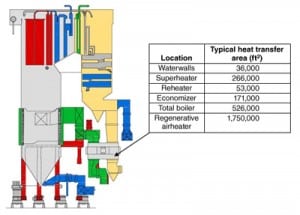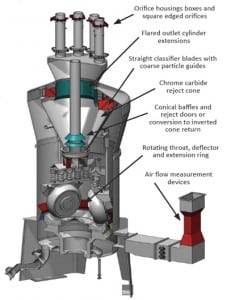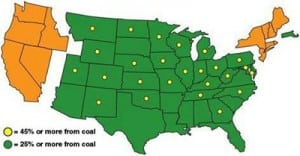COAL POWER Direct
-
Commentary
Which Comes First?
Proponents of carbon dioxide emission reductions from power plants are lamenting the decision by American Electric Power to cancel the carbon capture and sequestration plant at its Mountaineer facility in West Virginia. It’s not politics, it’s just business.
-
Coal
Innovations in Air Heater Design Produce Performance and Reliability Improvements
The regenerative air heater on a typical steam generator usually accounts for over 10% of a coal-fired plant’s thermal efficiency. A poorly performing air heater will cause an increase in the gas outlet temperature, often reducing the electrostatic precipitator collection efficiency and baghouse reliability. Recent design innovations enable restoration of this lost performance.
-
O&M
Pulverizers 101: Part I
Pulverizers prepare raw fuel by grinding it to a desired fineness and mixing it with the just the right amount of air before sending the mixture to boiler burners for combustion. In Part I of three parts, we’ll examine the essentials of pulverizer capacity, what should be done after a coal pulverizer fire or other incident, and how to tune up pulverizer performance. In future articles we’ll discuss measuring pulverizer performance and performance optimization.
-
Coal
Is AEP Exaggerating Impact of Air Rules?
American Electric Power recently announced plans to retire over 6,000 MW of coal-fired generation in response to two looming Environmental Protection Agency air quality regulations. Is AEP exaggerating the impact of these regulations? Some members of Congress believe that to be the case. AEP disagrees.
-
Coal
House GOP Moves to Block EPA from Regulating Coal Ash as Toxic Waste
Continuing the House Republicans’ aggressive attack on Obama administration environmental proposals, a House subcommittee approved legislation in June to prevent the Environmental Protection Agency from regulating coal ash as a hazardous waste—one of two options the EPA is considering for tightening coal ash management regulations in response to a disastrous leak from a Tennessee Valley Authority ash impoundment in 2008.
-
Coal
Dominion to Convert Three Coal Plants to Biomass
Dominion Virginia Power has asked the Virginia Corporation Commission for approval to convert three aging and relatively small coal-fired plants to biomass, saying the move would provide substantial long-term savings to customers while cutting air emissions and creating hundreds of forest-related and trucking jobs in the state.
-
Commentary
Water Issues, Carbon, and Price of Power Top Utility Concerns
In a clear sign of growing industry unease about the availability of water for power plant operations, utility officials recently surveyed by Black & Veatch on a host of policy and business issues ranked water supply as their second-highest environmental concern and identified water management as the business issue that could have the greatest impact on the utility industry in the near future.
-
Commentary
Your Guide to Retirement
Someone once said that "life begins at retirement." For people, perhaps, but not for our aging inventory of coal-fired power plants that are slated for retirement during the next decade.
-
Coal
Biomass Boiler Market Remains Unpredictable
Utilities struggling to meet renewable portfolio standards requirements have studied the conversion of existing coal-fired boilers to burn biomass. The results of those studies have been mixed, although test burns continue; the results of one such test are included. Overall, the market is tending toward smaller biomass projects, and the low price of natural gas is perhaps the biggest reason utility-scale projects are now few and far between.
-
Coal
Re-Industrializing America with Clean Coal Technologies
Balancing the rising energy needs of a globally expanding population (most of which lives in poverty) against the need to reduce increases in atmospheric emissions is a monumental problem. What role can clean coal technologies play?



